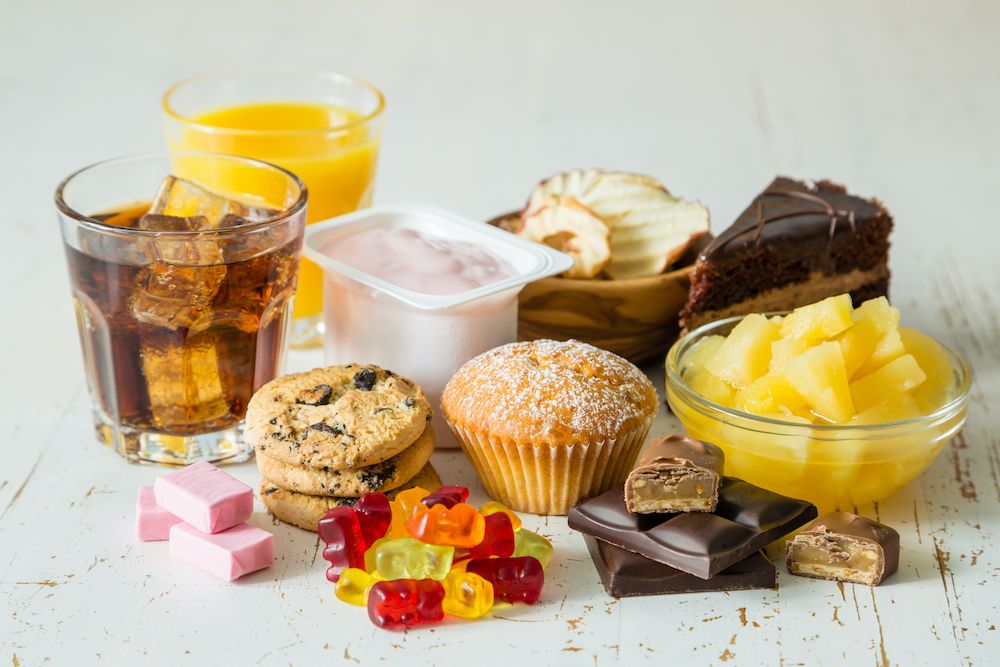
What’s the relationship between sugar and mental health, and how can we make sure it’s a balanced one?
Sugar plays a huge role in our food culture, packed into tasty treats and everyday snacks. That said, it’s fair to say the sweet stuff doesn’t have the best press, with the way that it can negatively affect our physical health widely known and accepted – but is there a relationship between sugar and our mental health? Does consumption have any effect on our wellbeing, and how can we make sure that we find a good balance? To help us explore the topic, we spoke to dietitian Katherine Kimber.
A sticky situation
“The jury is somewhat out on this subject,” Katherine says, when she considers the possibility of a link. “Does sugar result in poorer mental health? Or does poorer mental health result in more sugar intake? Throw dieting and restriction in the mix, which we know can increase the risk of disordered eating and sugar cravings, it’s difficult to come to a clear conclusion.”
Katherine points to a 2014 study published in The American Journal of Clinical Nutrition, that found that a Mediterranean diet – which is typically lower in sugar – may reduce the risk of depression.
“However, observational studies do not determine causation,” Katherine adds. “This means it can’t be determined if a lower quality diet causes lower moods, or if lower moods cause lower quality diets. It’s a real chicken and egg situation…”
In another example, a randomised controlled trial called the SMILES Study, the impact of a Mediterranean diet was reviewed once again.
“The SMILE Study took participants and randomised them into two groups,” Katherine explains. “One group received support from a dietitian to help with dietary changes, mindful eating, and goal setting. The other group had weekly befriending support, but no advice on food. The dietitian intervention group had significant reductions in depression symptoms at the three-month follow-up when compared to those who did not receive dietary change support.”
The reasons for this are thought to be:
- Reduced inflammation
- Reduced tissue damage via oxidative stress
- Increased brain plasticity, which supports the brain’s ability to change and adapt
- Changes in gut bacteria
- Behavioural changes associated with cooking (i.e. meal planning, experimenting with cooking)

Sugar-coated
While the research is promising, Katherine says the picture is missing a key element that influences what we eat, and how we feel about it: diet culture.
“Food choice is not only influenced by our social status, mental health, and our ability to cook, prepare, and source foods – but also our beliefs about certain foods,” she explains. “If people believe a Mediterranean diet to be the only one that will benefit their mental health, they may experience food guilt and shame if they don’t follow that pattern of eating, for any reason.
“The role of sugar-containing foods and so-called ‘processed foods’ may suggest that higher intakes can increase mental symptoms, including low mood. However, a significant contributor may be this role of food guilt, which can mean people experience the ‘nocebo effect’ whenever they eat so-called ‘bad’ food.”
So, how can you tackle the pressure of diet culture, and harness a better relationship with sugar – which, in turn, could support your mental health? Katherine shares her tips:
1. Make sure you’re eating regular meals and snacks
This means eating roughly every three to four waking hours, and ensuring you are eating enough in this time, too. An appropriate amount of food will make sure you’re well-nourished, so you might feel less overwhelmed when you eat foods that contain sugar, like chocolate.
2. Focus on self-care and your emotional health
Are you taking time for yourself to relax, feel inspired, and feel like you’re having time off? Try writing a list of five things you can rotate on a daily basis to take care of yourself. Having a ‘self-care menu’ can support your relationship with sugar by helping reduce the desire to emotionally eat. Emotional eating is not a bad thing, but it’s helpful to extend coping skills so you have things in addition to food.
3. Don’t go cold turkey!
If you feel like you shouldn’t, or can’t, have a particular food, guess what? You want it more! Whether we physically restrict ourselves from the food, or emotionally restrict (feel bad for eating it), it can lead to intense feelings of deprivation. These, in turn, can build into uncontrollable cravings, and often bingeing.
"Making peace with food is essentially about making chocolate as emotionally charged as an aubergine"
When you finally ‘give in’ to these forbidden foods, eating can feel intense, overwhelming, and we can eat past the point of comfortable fullness. With a side serving of guilt!
The only way to truly overcome this is to experience eating the food you forbid. When we take these foods down from their pedestal and place them on a level playing field with all other foods, we truly get to ask:
“Do I even like this?”
“Do I want this now?”
“Will I feel deprived if I don’t eat it?”
Making peace with food is essentially about making chocolate as emotionally charged as an aubergine.
4. Create a list of all the sugar-containing foods that you might feel out of control with
Starting with those that are less overwhelming, take some time out and mindfully eat some of this food at a time when you’re not too stressed, tired and – importantly – not too hungry. Check-in with how eating this food makes you feel – is it pleasant, neutral, or negative? This exercise is aimed to help reduce the feelings of guilt you might feel around eating so-called ‘bad’ foods.
The aftertaste
Ultimately, while research is ongoing, there’s a chance now for you to consider your relationship on a personal level. Using the tips that Katherine shares, take some time to contemplate the role that sugar plays in your life. Let go of any morality issues, any feelings of virtue or guilt, and simply think about what makes you feel better. The best results are always uncovered when we lead with compassion and self-knowledge.
To learn more about your own relationship with food, or connect with a nutritionist like Katherine, visit nutritionist-resource.org.uk

